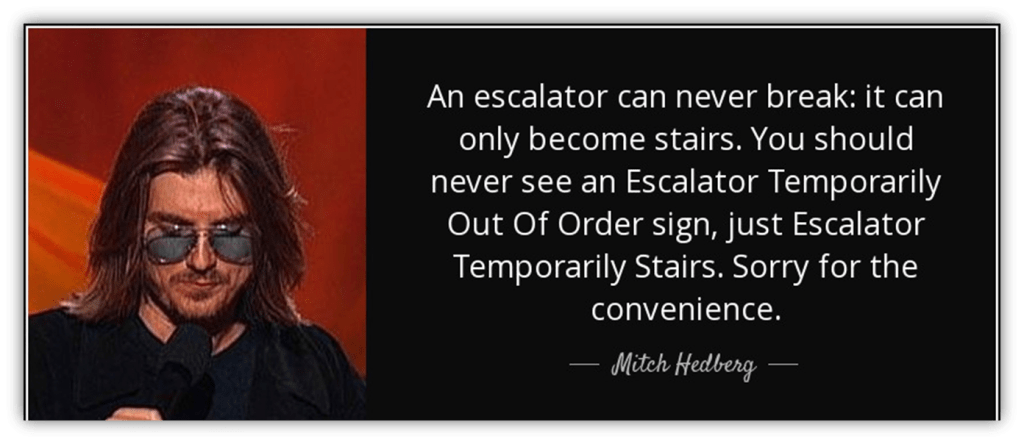Another in an occasional series on things that never fail to crack me up, for reasons I can never fully explain
Perhaps you are familiar with the comedy catchphrase: “Too soon?”
It’s that uncomfortable moment when a comedian miscalculates that the time is right to make a joke about a recent real tragedy:

Maybe a celebrity death, or a natural disaster. Or even a horrific, shared historical event.
The audience isn’t exactly sure whether to laugh, cringe, or be offended. Someone – sometimes the comedian themself – inevitably calls out the impropriety of the joke and says:
“Too soon.”
Let me introduce you to somebody who when I hear their name, I always say to myself, “too soon.” Not because he pushed boundaries or made audiences squirm. Not at all.
It’s for another reason.
Sometimes a comedian comes along who sees the world so differently that their perspective becomes impossible to forget. LIke this guy:

“I haven’t slept for ten days. Because that would be too long.”
When was the last time you thought about escalators? Like, really thought about them? Me, neither; I’d say somewhere on this side of “never.” It’s OK. Somebody else was paying attention:

Mitch Hedberg was a Saint Paul, Minnesota native.
After moving to Florida, he found work as a cook, dishwasher, and other restaurant odd-jobs.

In what seemed like a contradiction, this deeply anxious person found his voice through comedy, continuing to perform despite persistent stage fright.
Mitch’s unconventional style developed gradually through years of struggle.
He’d bomb spectacularly with unsuccessful performances at Florida open mics. He kept working and fine-tuning his comedy, and finally caught mainstream attention with a 1996 appearance on The Late Show with David Letterman. This is widely considered to be his “big break.”

The Letterman appearance clicked, and proved that his surreal, deadpan approach could resonate with a national television audience.
The breakthrough wasn’t finding the perfect setup or punchline structure. It was realizing that some truths are too pure to dilute with storytelling.
Hedberg built a comedy career on finding the absurd logic hidden in everyday observations.
But he did so via short, perfectly crafted declarations. He rarely had a joke that was more than three sentences long.

Unlike traditional comedians who would build a five-minute routine around a concept, Mitch delivered it with brevity and moved on to completely unrelated territory.
In a rare interview, Hedberg gave some insight about his escalator joke:

“I like things that are convenient and inconvenient at the same time.”
I’m not exactly sure what that means. But it somehow confirms that Mitch was consistently “on-brand.”
Hedberg discovered that the funniest observations don’t need construction; they need distillation. His comedy was philosophical. Like receiving middle-of-the night text messages from a very stoned Socrates.
“I don’t have a girlfriend. But I do know a woman who’d be mad at me for saying that.”

His tangential leaps were delightful:
- “Rice is great when you want to eat 2,000 of something.”
- “Dogs are forever in the push-up position.”
This wasn’t joke-writing in the traditional sense. This was comedic haiku performed by someone who seemed perpetually surprised by his own thoughts. Always delivered as if he were discovering these truths in the moment.
So: What’s So Funny About It?
Now, finally, back to the original question: why does this make me laugh? I think I’ve figured out why.
The surrealist sensibility:
- Hedberg’s comedy operated in a dreamlike logic where everyday objects and situations were twisted into absurd scenarios.

His jokes often followed non-linear thought patterns that mimicked how our minds wander – jumping from concept to concept in unexpected ways.
The stream-of-consciousness structure with deadpan delivery:
- Rather than traditional setup-punchline jokes, Hedberg’s sets felt like you listening to your own internal monologue.

This made his performances feel more intimate and conversational.
His fascination with literal meanings of words and phrases
- Noting the absurdity of common expressions or finding humor in semantic ambiguities was a key part of the his on-stage persona.

Hedberg was a master at deconstructing language and turning it into profoundly meaningful, yet simple late-night thoughts.
His performances live on YouTube, and in comedy fans’ memories. Millions have absorbed the wisdom of a man who noticed that “every picture is of you when you were younger.”
As we all know, comedy is subjective. But this kills me. See if you agree:
Mitch Hedberg was brutally honest about the weird way the world works, and hilariously gentle about the weird way people work within it. He saw absurdity everywhere and had the rare gift of making others see it too, one perfect sentence at a time.
His career was tragically cut short when he died in 2005 at age 37 from a drug overdose.

The comedy community was deeply affected by his passing, with fellow comedians offering heartfelt tributes that revealed both his unique talent and personal struggles.
Comedian Dave Attell, who frequently toured with Hedberg, remembered him as “exceptionally dedicated.”
“Of all the guys I’ve ever worked with, he always had a notebook in his hand. He always was thinking.“
“He always was never satisfied.”

You might agree that these times can feel heavy and complicated.
We could use more comedians like Mitch, who found profound silliness in the everyday, and get right to the point. Not feeling a need to build an entire routine around a simple idea.
In Mitch’s case, I think any stand-up audience would concur – but for all the right reasons:

Too soon.







You know when a comic bit is genuinely original when only one person really gets into it. I like that isolated laugh. There’s a delay from the other crowd members. They’re just laughing on cue. They’re expected to laugh That woman actually thought the joke through. It’s the bit about the belt. Same woman laughed about the “can of soup” even thought it received less approval from the studio crowd. Those are the funniest comics; not everybody’s cup of tea.
One of the greats.